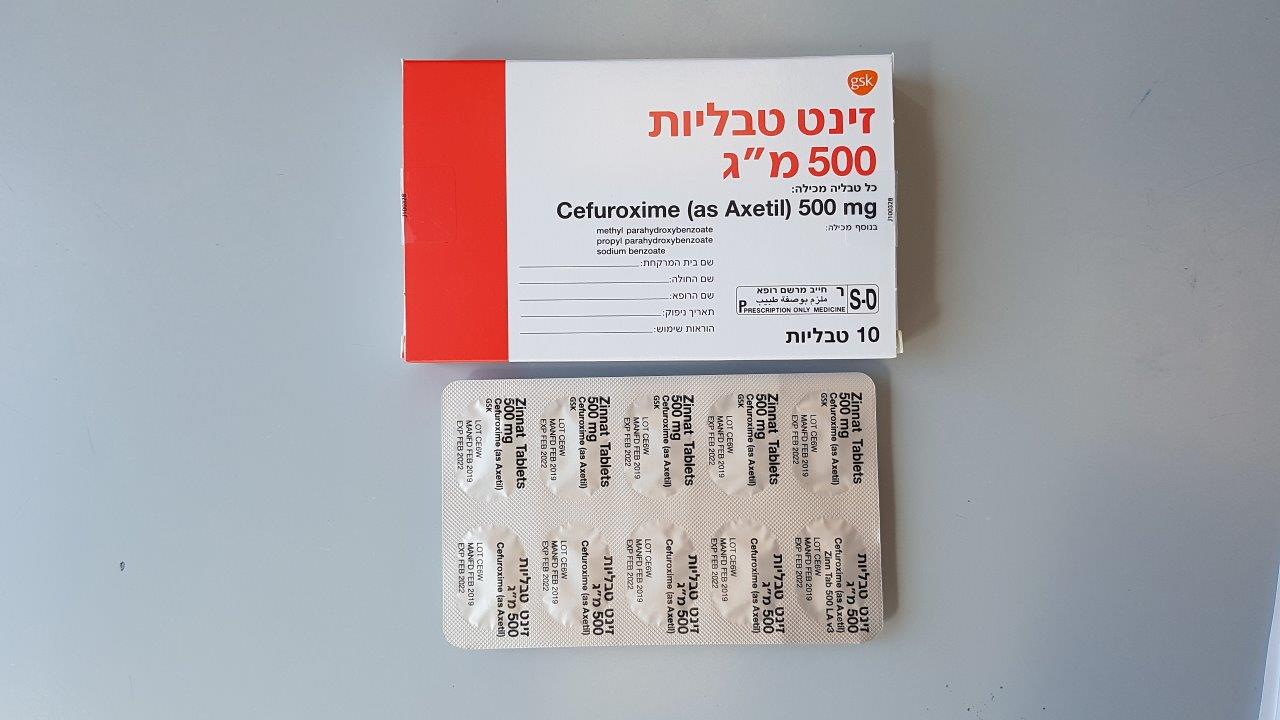Quest for the right Drug

זינט טבליות 500 מ"ג ZINNAT TABLETS 500 MG (CEFUROXIME AS AXETIL)
תרופה במרשם
תרופה בסל
נרקוטיקה
ציטוטוקסיקה
צורת מתן:
פומי : PER OS
צורת מינון:
טבליה : TABLETS
עלון לרופא
מינוניםPosology התוויות
Indications תופעות לוואי
Adverse reactions התוויות נגד
Contraindications אינטראקציות
Interactions מינון יתר
Overdose הריון/הנקה
Pregnancy & Lactation אוכלוסיות מיוחדות
Special populations תכונות פרמקולוגיות
Pharmacological properties מידע רוקחי
Pharmaceutical particulars אזהרת שימוש
Special Warning עלון לרופא
Physicians Leaflet
Adverse reactions : תופעות לוואי
4.8 Undesirable effects The most common adverse reactions are Candida overgrowth, eosinophilia, headache, dizziness, gastrointestinal disturbances and transient rise in liver enzymes. The frequency categories assigned to the adverse reactions below are estimates, as for most reactions suitable data (for example from placebo-controlled studies) for calculating incidence were not available. In addition the incidence of adverse reactions associated with cefuroxime axetil may vary according to the indication. Data from large clinical studies were used to determine the frequency of very common to rare undesirable effects. The frequencies assigned to all other undesirable effects (i.e. those occurring at <1/10,000) were mainly determined using post-marketing data and refer to a reporting rate rather than true frequency. Placebo-controlled trial data were not available. Where incidences have been calculated from clinical trial data, these were based on drug- related (investigator assessed) data. Within each frequency grouping, undesirable effects are presented in order of decreasing seriousness. Treatment related adverse reactions, all grades, are listed below by MedDRA body system organ class, frequency and grade of severity. The following convention has been utilised for the classification of frequency: very common 1/10; common 1/100 to < 1/10, uncommon 1/1,000 to < 1/100; rare 1/10,000 to < 1/1,000; very rare < 1/10,000 and not known (cannot be estimated from the available data). System organ Common Uncommon Not known class Infections and Candida Clostridium difficile infestations overgrowth overgrowth Blood and eosinophilia positive Coomb’s haemolytic anaemia lymphatic test, system disorders thrombocytopenia, leukopenia (sometimes profound) Immune system drug fever, serum sickness, disorders anaphylaxis, Jarisch- Herxheimer reaction Nervous system headache, disorders dizziness Gastrointestinal diarrhoea, vomiting pseudomembranous colitis disorders nausea, (see section 4.4) abdominal pain Hepatobiliary transient jaundice (predominantly disorders increases of cholestatic), hepatitis hepatic enzyme levels Skin and skin rashes urticaria, pruritus, erythema subcutaneous multiforme, Stevens- tissue disorders Johnson syndrome, toxic epidermal necrolysis (exanthematic necrolysis) (see Immune system disorders), angioneurotic oedema Description of selected adverse reactions Cephalosporins as a class tend to be absorbed onto the surface of red cells membranes and react with antibodies directed against the drug to produce a positive Coombs’ test (which can interfere with cross-matching of blood) and very rarely haemolytic anaemia. Transient rises in serum liver enzymes have been observed which are usually reversible. Paediatric population The safety profile for cefuroxime axetil in children is consistent with the profile in adults. Reporting of suspected adverse reactions Reporting suspected adverse reactions after authorisation of the medicinal product is important. It allows continued monitoring of the benefit/risk balance of the medicinal product. Any suspected adverse events should be reported to the Ministry of Health according to the National Regulation by using an online form https://forms.gov.il/globaldata/getsequence/getsequence.aspx?formType=AdversEffectMedic@m oh.gov.il Additionally, you should also report to GSK Israel (il.safety@gsk.com)

שימוש לפי פנקס קופ''ח כללית 1994
Upper & lower respiratory tract infections (sinusitis, otitis, chronic bronchitis, pneumonia) genitourinary infections, pyelonephritis caused by: staphylococcus aureus & epidermidis (excluding methicillin resistant strains), streptococci (excluding enterococci), H. influenzae (including beta lactamase resistant strains) Branhamella catarrhalis, E. coli, klebsiella species, proteus mirabilis, proteus rettgeri, providencia, N. gonorrhea (including penicillinase producing strains)
תאריך הכללה מקורי בסל
01/01/1995
הגבלות
תרופה שאושרה לשימוש כללי בקופ'ח
מידע נוסף
